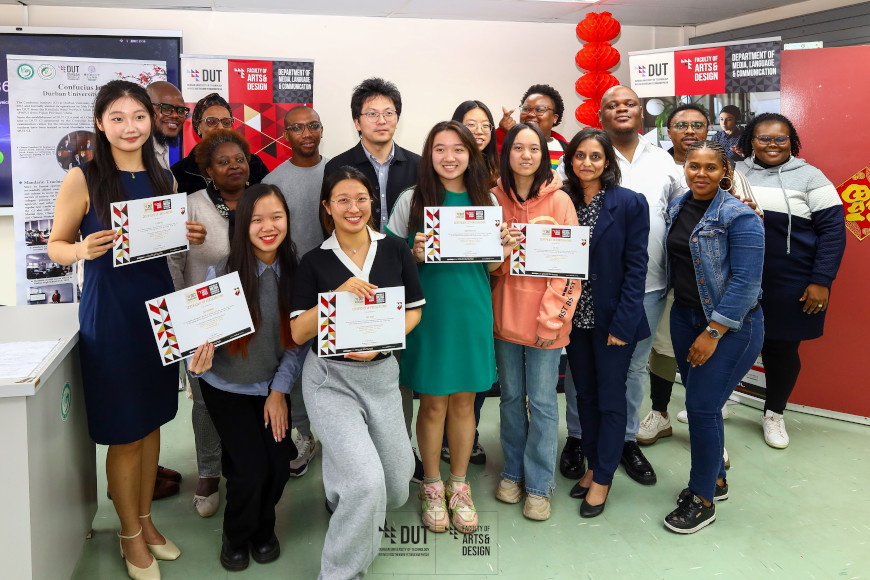The Department of Media, Language and Communication, Language Practice Programme at DUT, in partnership with the Confucius Institute, bid farewell to Chinese international exchange students from Beijing Foreign Studies University (BFSU), marking the first successful China exchange programme in this kind. The event was held at the ML Sultan Campus, Confucius Institute Lab on Tuesday, 10 June 2025.
The event was full of energy, celebrating the successful completion of the isiZulu Language and Culture Summer Camp from February to June 2025 by six students. The programme facilitator, Minenhle Khumalo welcomed all guests and lecturers, highlighting the importance of such exchange partnerships.
Lin Wu Frank, Co-Dean of the Confucius Institute at DUT, shared that in 2018, the CI facilitated a partnership between DUT and Beijing Foreign Studies University, one of China’s top universities for multilingual education andthe first and only university to offer isiZulu as a degree programme. .This collaboration laid the foundation for the “isiZulu Summer Camp,” a unique programme that enables Chinese students studying isiZulu to immerse themselves in the language and culture of KwaZulu-Natal.
“Our main responsibility is trying to promote mutual understanding and exchange between China and South Africaby offering various programmes, driven by a vision of enabling people to access opportunities in both countries,” said Mr. Wu.
“I believe all six of our Chinese students have performed exceptionally well in learning the language and have thoroughly enjoyed their time in KZN. I am very proud of them. I would like to thank all the lecturers in the Language Department and colleagues in the IEP office, Your efforts and dedication in making this a wonderful event are greatly appreciated,” Mr. Wu added.
Jing Yun Yu said that her journey at DUT had been a very meaningful experience for her. She shared that she had learned a lot over the five months, particularly from her four teachers who had taught her about isiZulu, the culture, and life, giving her a deep understanding of both. She described it as one of the most unforgettable memories of her life. She also mentioned meeting many lovely friends, like Anele, and expressed her gratitude for the teachers’ help and support for her and her friends.
Ms Tasneem Seedat from the Language Practice programme stated that the partnership reflects the commitment on promoting African linguistic heritage and developing globally competent graduates. She highlighted that while many students have traveled to China, this year marked a milestone with the inaugural cohort of six Chinese exchange students (February-June 2025) successfully completing intensive isiZulu and intercultural studies.
“Beyond formal classes, we paired them with our Language Practice students for daily cultural exchange. Watching them navigate real-world isiZulu conversations and cultural exchanges together was easily one of the programme’s highlights, so much so that this peer-learning model will remain central for future cohorts. We are already looking ahead to welcoming the next group and deepening this partnership,” she added.
Wan Ting Wang shared that she had made many friends and learned about their real lives during her stay. She also mentioned that visiting rural areas was another unforgettable experience. She expressed her desire to stay in touch with them even after returning to China. Beyond her studies, she explored many places in South Africa.
Wang said, “Having an opportunity to visit places I dream of, like Johannesburg, Pretoria, and Bloemfontein, was special. I think South Africa is very special because it has so many official languages, and every time people hear that I can speak isiZulu, they feel surprised and proud.”
Nombuso Shandu, a third-year Language Practice student, highlighted the importance of having exchange students, stating that it’s about exchanging cultural understanding and origins, as well as sharing their own with ours. Shandu appreciated the student’s openness and friendliness, which enabled them to have meaningful experiences together outside of class.
Mrs Ntombezinhle Cele, the students’ Translation Lecturer and the Programme Coordinator of Language Practice Programme, reflected on the students’ journey before handing over certificates. She praised their enthusiasm and unmatched work ethic. She promised that future students would have more time for practical Zulu experiences, like cooking over an open fire.
The students had embraced their cultural immersion by adopting Zulu names. Yimei Wei was now Amahle, Chenwei Zhu was Olwethu, Yijia Zhao was Zamile, Xia Wu was Hlengiwe, Wanting Wang was Nkanyezi, and Jingyun Yu was Phaphama, symbolising their connection to the isiZulu language and culture.
The language practice students showed great interest in having Chinese students as peers, having learned much from them. They expressed a desire for a similar programme that would teach them Mandarin, recognising that learning a language also means learning about the culture and daily practices.
Pictured: Six students with their certificates alongside with their lecturers.
Photographer: Mphiliseni Manqele
Phiwayinkosi Sibiya

